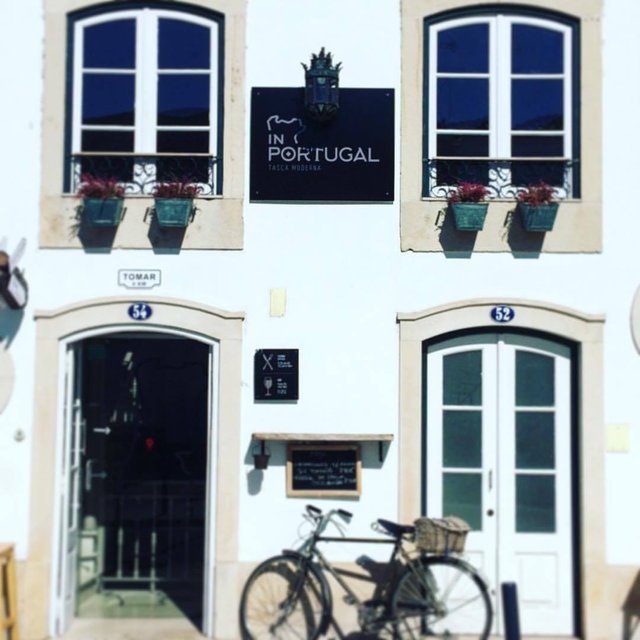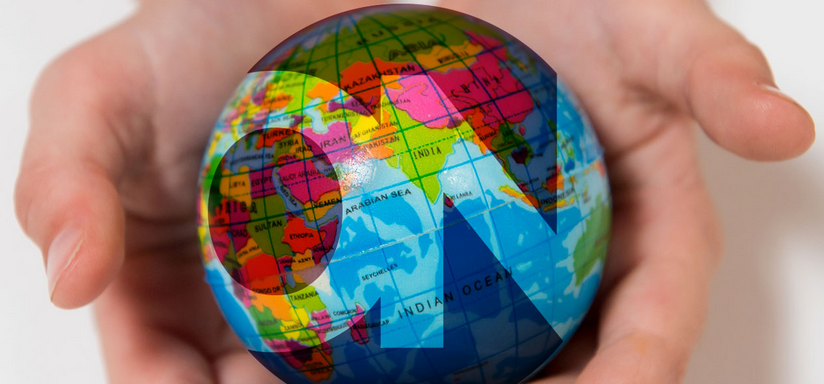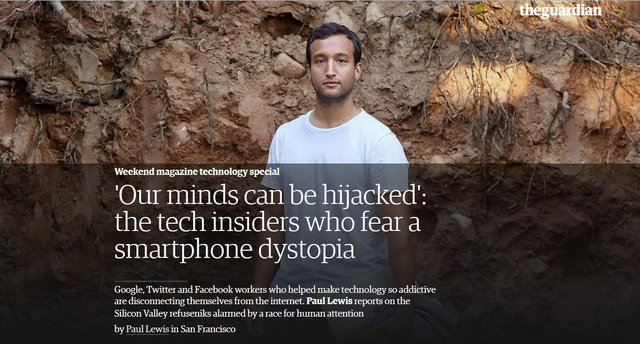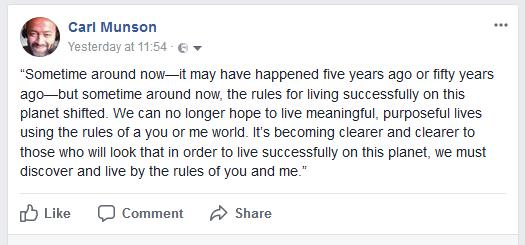My long-held dream of moving to Portugal is a now a reality of some three weeks. Generally, I'd say we (our family unit of four) are feeling very comfortable out of our previous 'comfort zone', which became uncomfortable - well actually impossible - through redundancy.
For us, life here is simpler. More real. Little can be taken for granted. And being in a strange land is keeping our minds open and our hearts on our sleeves. Free of the distracting power of the daily round, such as we knew it, the grown-ups among us are again free to consider the big questions of life:
"What are we going to do with the rest of our lives?"
"What is the purpose of our lives?"
"How do we really want to live?"
And "How can we make a difference?"
For work and livelihood, we're both fortunate it seems to be a laptop-based and Internet-connected. Louisa a gifted, professional astrologer (https://louisatannermunson.com/) who consults via Skype and me, a mover and shaker for OurNet - a project aiming to reshape the very foundations and future of cyberspace.
(http://about.ournet.news)

[In Portugal: For us, life here is simpler. More real.]
Though freed of many a modern preoccupation in our new way of life and choices, we're still susceptible to the core drivers of humanity like survival and fear, and for now at least, have them in conscious sight. It's a mixed blessing and a great opportunity. Fishes out of our accustomed water, travel is broadening our minds and opening our hearts. But also scaring the living Bejabbers out of us on the colder and darker nights of the soul, currently locked on ‘search’ mode.
It's perhaps no accident that for a living, my wife looks to the stars, and I'm re-shaping life as we know it online. This too is our life: looking for signs, taking things apart and seeking a better way.
OurNet is searching for the soul of the Web, which it would appear is being systematically sold to the database devil. A 'Virtual Village', where I'm community builder and 'Town Crier', its mission is to re-humanise, de-corporatise, refine communication and reward good behaviour in the cyber space. The wish for 'a world that works' for all is our great aim; one driven by the great decentralising promise and ethics of blockchain technology.

[OurNet: The 'Virtual Village', where I'm the Town Crier]
Whilst clear and passionate about our vision, it’s fair to say we really have little idea about the mechanics of how it's all going to work. A statement I realise to be true for both work and family life, as I see it emerge on the screen in front of me.
The world and its online reflection are not pretty pictures to me. And in my efforts to ignite the subtly glowing spark of OurNet's vision into a raging blaze, I return to the source of our inspiration and those men who previously and notably aimed for a world that worked - Buckminster Fuller and Werner Erhard.
In his inspiring article Building "A World that Works", Jonathan Cloud evokes the genius of both men saying:
"From a transformational standpoint, it’s not enough to recognize that all of life is really one, that we are all interconnected. It’s also necessary to awaken people to the realities of our collective existence; to liberate people from the ignorance and deceptions of the past; and to empower people to engage fully with life, to create meaning and purpose and sufficiency."
In my freer and more open state of mind, I’m beginning to wonder if this is true.
To my Facebook timeline yesterday, I posted this gem from Werner Erhard:
"...each one of us has the opportunity to make a choice about what life is really going to be about. Is it going to be about making it—or making it work? Are we going to continue to keep our visions and dreams to ourselves—or are we going to bring them to life? Are we going to be buried with our potential still intact, with our gift undelivered—or will we seize the opportunity to live life as if we make all the difference?"
And this one too:
“Sometime around now—it may have happened five years ago or fifty years ago—but sometime around now, the rules for living successfully on this planet shifted. We can no longer hope to live meaningful, purposeful lives using the rules of a you or me world. It’s becoming clearer and clearer to those who will look that in order to live successfully on this planet, we must discover and live by the rules of you and me.”
Liking thumbs validated both statements in my echo chamber, and I felt inspired and invigorated. A world that works for you AND me, could remain my beautiful obsession and power me onward. I do not want to die with my ‘gift undelivered’.
The neo-liberal, materialistically-minded chains that have bound humanity will one day melt when faced with the white heat of the blockchain. Crytopcurrency will undermine capitalism as the ‘unbanked’ take to the markets with their $5 smart phones.
All well and good!
However. Yes, however. Later that same day my eyes fell upon a chilling article. In the UK Guardian, where Paul Lewis ‘reports on the Silicon Valley refuseniks alarmed by a race for human attention’ in a deeply alarming piece entitled: ‘Our minds can be hijacked': the tech insiders who fear a smartphone dystopia.
I felt the inspired blood drain from my face, as Lewis’s revelations reminded me of what seems to invariably happen to good intentions and best laid plans.
Those in the know, the Dr Frankensteins if you like, workers at Google, Twitter and Facebook - who helped make technology so addictive - are now disconnecting themselves from the Internet. For the rest of us, our attention is held in place as our data is milked from our techno-teats. If you replace the euphemism 'big data' with personalised surveillance, for that's what it is, you'll get a sense of what's going on and where we're headed.
Creator of the 'like' button himself, Justin Rosenstein, reminds us: “It is very common for humans to develop things with the best of intentions that have unintended, negative consequences.”

[“It’s the impulse to check a message notification. It’s the pull to visit YouTube, Facebook, or Twitter for just a few minutes, only to find yourself still tapping and scrolling an hour later.”]
The algorithms that we increasingly hear of, that are so highly prized in focussing and controlling our individual and collective behaviour, are clearly more malgorithm than palgorithm.
Whilst Facebook will inevitably and eventually face its demise, be sure that venture capitalists are already hedging their bets and covering all options with their fear-based colonisation of every other good thing that's coming to market and/or endeavouring to make the world a better place.
Even later that same day, I chanced upon a BBC series - Billion Dollar Deals and How They Changed Your World, where Jacques Peretti 'explores the deals which have shaped the way we understand money'.
In the episode I had the misfortune to be glued to, like the TV equivalent of rubber-necking, I watched the ‘story of how tech giants brought about the digital payment revolution and formulated a plan to one day kill cash’, a phenomenon you can surely see for yourself unfolding on a daily basis.
The programme asks the question: “Is this new world of digital, hyper-fast spending in our interests?” Based on our experience of corporations and banks, I think we know the answer to that. It may be no understatement to say we are fast approaching ‘serfing’ the net, rather than surfing it, upon waves of previously promised self-determination and freedom.
(Incidentally, do you know what supposedly brought Serfdom to an end in Europe? No, not a well-meaning vision, but the black death - perhaps the oldest form of ‘disruption’ known to man.)
In my mind's eye, on a good day, I surf the web. With sand-dusted, scruffy, blonde hair and a bronzed, buff physique I stand proudly on my board. I ride the waves with ease, coolly acknowledging a growing and admiring audience, allowing my GoPro to relay and relive the action, sovereign and free - building my following on numerous social media platforms.
In reality, my life on the Internet is increasingly one of serfdom. It's an addictive terrain manipulated for my convenience and pleasure by a tiny handful of seemingly, well-meaning corporations, who control my experience and data for their financial benefit and lust for market domination.
As the Internet becomes more a net in which we've become enmeshed, rather than a place of true net-working, I wonder if I, if we, can really make a difference? What chance does Da(ta)vid have against Google-iath?
In our new context abroad, I’ve been encouraged to write a book, or create a blog, or start a YouTube channel about our experiences in Portugal – ‘Join Carl, Louisa and kids as they go about creating a world that works in The Algarve’. But wouldn’t that just become more tradable data for the new gaffer, as in the GAFA made of Google, Apple, Facebook and Amazon? Is it time for me to stop being distracted by their seductive and addictive claims upon my precious attention?
As much as I resent being an asset of the conventional economy, I similarly resent being coveted as an asset of what Silicon Valley and its dark rulers are calling the 'attention economy'. My attention, my consciousness, is a precious thing that I would like to spend wisely. Yet, just like the aforementioned tech' turncoats, I'm not sure that I have invested intelligently in these last few years of disruptive, rapid and addictive technological progress.
All that gloom and doom said, I still truly want a world that works. One that works for me AND you, not just me OR you.

What I want for the world and the Web, is of course what I want for myself: freedom, fun, privacy and trust. Less conflict, more love and respect.
Am I aiming to high? Too big? Should I just focus on a life that works rather than a world that works? Should I replace being hopeful for the future with being helpful in the here and now?
After all, did Erhard and Fuller - with all their brilliance - actually create a world that worked?
Guardian piece: https://www.theguardian.com/technology/2017/oct/05/smartphone-addiction-silicon-valley-dystopia
BBC Programme: http://www.bbc.co.uk/programmes/b097rqr4
Excellent Blockchain documentary: http://blockchain-documentary.com/